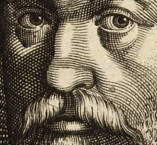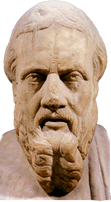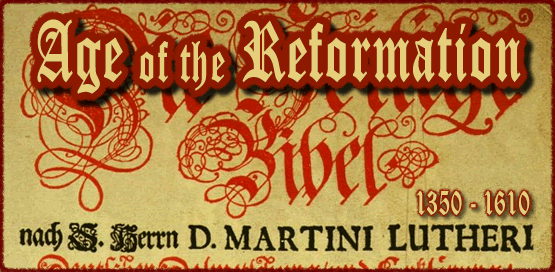|
|
|
|
 Johann Gerhard
Johann Gerhard
 |
|

 Theological and Ecclesiological Terms
Antinomianism: The belief that a person already in a state of grace or salvation was not bound to follow earthly moral laws. Although the charge of antinomianism has been made throughout the history of Christianity, during the Reformation, it was leveled against the adherents of the doctrine of justification by faith alone. Atonement: The reconciliation of sinful humans with God that is the result of the death of Christ for the sins of humanity. Augustinianism: Theological school based on the beliefs of St. Augustine of Hippo. He stressed the need for divine grace for humans to gain salvation in opposition to Pelagianism. Cardinals, College of: Ecclesiastical officials in Rome who were papal advisors and princes of the Church. They formed an electoral college that voted to fill vacancies in the papacy. Confession: Name for a statement of theological beliefs issued by Protestant churches, e.g., the Augsburg Confession. Confessionalism is the historian’s term for the use of statements of religious beliefs to forge national or territorial identities in Germany and other countries. Princes assumed greater responsibility over the morals and behaviors of their subjects as well as their religious beliefs. Consubstantiation: Name for the doctrine of the real presence of Christ in the Eucharist that Martin Luther advocated. He asserted that the bread and wine and the body and blood of Christ coexisted in the Eucharist. Christology: Branch of theology concerned with the nature of Jesus Christ as God and man. Curia: Name for the papal court. Devotio Moderna: Late medieval revival of spirituality and piety that originated in the Netherlands in the fourteenth century and spread to other parts of Europe. Its followers were sometimes known as the Brethren of the Common Life and they participated in voluntary associations of laity and clerics. Diocese: Ecclesiastical unit of administration presided over by a bishop. Exegesis: The process of explaining, expounding, or interpreting a text in a critical manner. In Biblical studies, exegesis involved employing knowledge of the ancient Biblical languages of Hebrew, Aramaic, and Greek. Grace: Theological term for the assistance that God provides to humans in the process of sanctification. All Christian theologians agreed that grace existed but there was considerable disagreement during the Reformation about the degree of importance that grace played in sanctification. Hermeneutics: In general, the study of interpretation of texts, in theology, the study of the methods of interpreting the Bible. Iconoclasm: The breaking of sacred images because they are regarded as idols. Justification: Theological term for the process by which sinful humans are either made or declared to be righteous in the sight of God. Protestants viewed this process as completely in the hands of God through grace and accomplished without any assistance by the sinful human. Nepotism: Practice of a public or ecclesiastical official employing one’s relatives in a public institution or church. Necodemites: Name given to secret professors of Protestantism, i.e., those afraid or unwilling to publicly show their faith. Name derives from the Jew, Nicodemus, who secretly came to see Jesus. Nominalism: Late medieval approach to theology that emphasized anti-realism. Nominalist viewed the names or words for things and concepts were merely human inventions that did not have a separate or real existence. Original Sin: Theological doctrine that all humans are born sinful due to the first sin of Adam and Eve in the Garden of Eden. It means that by nature, humans are sinful and bad. Patristic: Referring to the Early Church era, the era of the Church Fathers [patri]. Pelagianism: Theological doctrine that asserts that humans can merit their own salvation through good works and exercising their free will to gain faith in God and accept salvation. St. Augustine of Hippo opposed this doctrine. Province: Unit of ecclesiastical territory presided over by an archbishop. Quadriga: Term for the four-fold interpretation of the Bible used in the Middle Ages—literal, allegorical, tropological, and anagogical. Quadrivium: Name for the subjects of arithmetic, geometry, astronomy, and music, the lesser of the seven liberal arts in the medieval curriculum. Realism: Medieval theology developed the philosophical concept that abstract concepts called “universals” have a real and separate existence from the particular things or ideas that they describe or embody. This concept of realism followed Platonic philosophy. St. Thomas Aquinas would use the Aristotlean concept of universals to argue that universals did not exist apart from their “particulars”, the individual things or ideas that they described. The doctrine of transubstantiation derived from universals and realism. Sanctification: Theological term for the process of sinful humans becoming holy and attaining salvation. Protestant Reformers tended to view sanctification as an internal process taking place in the believer that was distinct from justification. Roman Catholic theology tended to merge justification and sanctification together. Schism: Refers to any institutional division in the Church as opposed to a doctrinal division which is termed heresy. The Great Schism involved two and three popes holding office simultaneously and so dividing the Church and creating a schism. Schola Augustiniana Moderna: School of late medieval scholasticism that placed a strong emphasis on St. Augustine’s view of grace in salvation. Scholasticism: Medieval approach to theology that flourished from 1200-1500. It tried to formulate doctrines rationally and systematically. Scotism: School of scholastic theology associated with Duns Scotus. Simony: Act of selling a church office. It is condemned in the Book of Acts and was illegal in canon law. Sola Fide: Meaning “by faith alone”, a term commonly used in Luther’s theology of justification. Sola Scriptura: Meaning “by scripture alone”, a term used in Protestant theology to emphasize the Bible as the only source of authority in the doctrines and practices of the Church. Soteriology: That part of theology concerned with the doctrine of salvation. Synod: Name for an ecclesiastical assembly for purposes of governing or advice. In the Reformation Era, Calvinists used the synod for meetings of their clergy as was the case in France. Thomism: School of scholastic theology associated with St. Thomas Acquinas. Transubstantiation: Name for the doctrine of the real presence of Christ in the Eucharist that asserts that the priest’s act of consecration miraculously transforms the bread and wine of Holy Communion into the body and blood of Christ. While the “accidents” [outward appearance] of the bread and wine remain, the “essence” [true nature] is now literally Christ’s body and blood. In this way, the service of the Mass recreates the sacrifice of Christ over and over again. This doctrine became the official position of the Roman Catholic Church during the Council of Trent. Trivium: Name for the three subjects of grammar, logic (dialectic), and rhetoric, the three most important areas of study in the seven liberal arts of the medieval curriculum. The word trivial is derived from trivium. Universals: Philosophical concept which attributes a separate existence to words or concepts that describe things or ideas. Platonic universals have a separate existence from the individual things or “particulars” that they describe in the world, e.g., the universal of ‘chair’ exists apart from all chairs. Aristotelian universals only exist in relationship to the particular things that form them, e.g., all existing chairs form the universal of chair which does not exist apart from the set of all existing chairs. Via Antiqua: “Ancient way”, school of late medieval theology that focused on Aristotelianism and Thomism. Via Moderna: “Modern way”, school of late medieval theology associated with nominalism. Vulgate: Name for St. Jerome’s Latin translation of the Bible. It was considered the official Latin version of the Bible. Printer FriendlyFor a printer-friendly version of this webpage, If you don't have the Reader on your pc,  |
|
|
|
Historian, author, teacher, and higher education administrator, Dr. Ronald H. Fritze is Dean of the College of Arts and Sciences at Athens State University in Athens, Alabama. Ron has written for CornDancer since 2004. |
|
|
|
|


